七年级英语下册《Unit11Howwasyourschooltrip(第2课时)》导学案(无答案)(新版)人教新目标版
初中英语 七年级下册 Unit11How was your school trip

the trip the train
the museum
the gift shop and gifts
Helen
exciting fast
really interesting
lovely, not expensive
Jim terrible slow
big, boring, dark, too many people
2. Learn about Helen’s and Jim’s diary entries. 3. Learn to write diaries with past tense.
Lead-in
Look at the pictures and talk —I +v-ed(went to …)/ —It/That sounds…
The museum was big and boring. Everything was
about robots and I’m not interested in that.
be interested in… 对……感兴趣
hear v. 听到;听见。 用法:hear sb. do sth. 听到某人做 某事(全过程)hear sb. doing sth. 听到某人正在做某事
✓ 特殊疑问词+不定式结构可改写成由该疑问词 引导的宾语从句,改写时在疑问词后加主语 (与主句主语一致),将不定式改成“should+ 动词原形”作谓语。
You have to consider what to do next. =You have to consider what you should do next.
总的来说,相当于in a word或in short.
临泉县X中学七年级英语下册Unit11Howwasyourschooltrip第二课时Section
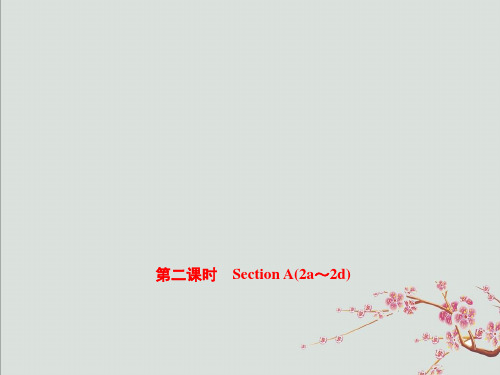
8.—__B__ do you like the panda? —Because I think it's interesting. A.When B.Why C.Where D.How 9.— _A___ do you like the film American Captain 3? —It's wonderful ! I like it very much. A.How B.Who C.What D.When 10.— _A___ are you going to buy for your father for Father's Day? —A Tshirt. A.What B.When C.Where D.How
17.农村的空气非常干净。
The air in the countryside is very clean
18.关于这件事他什么也没有说。
He didn't say anything about this thing.
19.学生们学到了相当多的农事。
The studentlsearned a lot about farming
B A
: :
You're Really
r?igHhotw.D2d1i.d
you
go
there?
B : 22. A : WerEe there many people in the park?
B : Yes.It was very crowded(拥挤的).
A B
: :
2W3e.Fw documentb_y___c_li_ck_i_n_g___〞_s_a_v_e_”_______. ___H_o_w__d_o_____yousa_v_e_______your document? 20.The girl __in___r_e_d___reads books every morning. __W__h_ic_h___girl _r_e_a_d_s_____books every morning?
七年级英语下册Unit11Howwasyourschooltrip说课稿(人教新目标版)
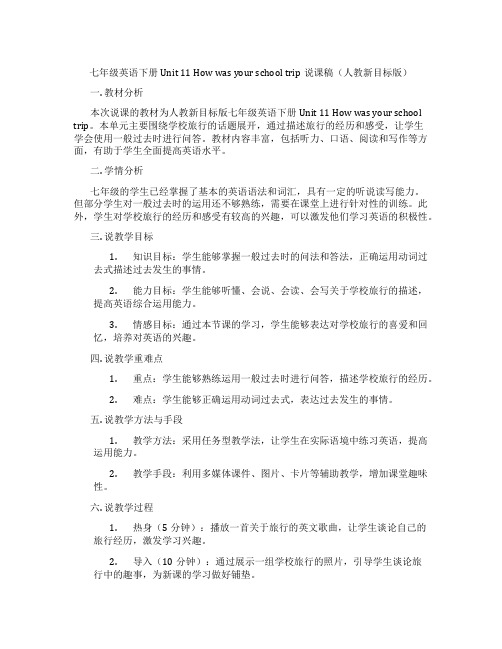
七年级英语下册 Unit 11 How was your school trip说课稿(人教新目标版)一. 教材分析本次说课的教材为人教新目标版七年级英语下册Unit 11 How was your school trip。
本单元主要围绕学校旅行的话题展开,通过描述旅行的经历和感受,让学生学会使用一般过去时进行问答。
教材内容丰富,包括听力、口语、阅读和写作等方面,有助于学生全面提高英语水平。
二. 学情分析七年级的学生已经掌握了基本的英语语法和词汇,具有一定的听说读写能力。
但部分学生对一般过去时的运用还不够熟练,需要在课堂上进行针对性的训练。
此外,学生对学校旅行的经历和感受有较高的兴趣,可以激发他们学习英语的积极性。
三. 说教学目标1.知识目标:学生能够掌握一般过去时的问法和答法,正确运用动词过去式描述过去发生的事情。
2.能力目标:学生能够听懂、会说、会读、会写关于学校旅行的描述,提高英语综合运用能力。
3.情感目标:通过本节课的学习,学生能够表达对学校旅行的喜爱和回忆,培养对英语的兴趣。
四. 说教学重难点1.重点:学生能够熟练运用一般过去时进行问答,描述学校旅行的经历。
2.难点:学生能够正确运用动词过去式,表达过去发生的事情。
五. 说教学方法与手段1.教学方法:采用任务型教学法,让学生在实际语境中练习英语,提高运用能力。
2.教学手段:利用多媒体课件、图片、卡片等辅助教学,增加课堂趣味性。
六. 说教学过程1.热身(5分钟):播放一首关于旅行的英文歌曲,让学生谈论自己的旅行经历,激发学习兴趣。
2.导入(10分钟):通过展示一组学校旅行的照片,引导学生谈论旅行中的趣事,为新课的学习做好铺垫。
3.新课呈现(15分钟):讲解一般过去时的问法和答法,示例说明如何用动词过去式描述过去发生的事情。
让学生跟读、模仿,确保正确掌握。
4.实践环节(15分钟):学生分角色扮演,模拟学校旅行的场景,运用一般过去时进行问答。
二连浩特市四中七年级英语下册Unit11Howwasyourschooltrip第二课时Sectio

16.—Did you talk with a movie actor?
—___A_____.
A.Yes,I did B.Yes,I do C.No,I don't D.No,I'm not
17.—How ____C____ your last weekend?
—It ________ great.But I ________ tired now. A.was;was;was B.is;was;am C.was;was;am D.is;is;am
小练习 : 醒醒 ! 上课了。 __W__a_k_e_ ___u_p___! Class begins.
Words
need / niːd /
动词,表示〞需要” ;还可作n. 需要,必须; 还可以用作aux. 需要,必须 eg : I need to spend more time studying.我必需花更多时间来学习。
Words
start / stɑːt /
(2)用作及物动词 意为〞使开始,开始;使开始运转,启动”。
eg : He started life as a teacher before turning to journalism. 他开始当过教师,后来改行搞起新闻。
小练习 : 请告诉我怎样启动这台电脑。 ________P_l_e_a_s_e _te_l_l_m_e__h_o_w__to__s_ta_r_t _th_e__c_o_m_p_u_t_e_r.____
新人教版七年级英语下册Unit 11 How was your school trip Sectio

1b. Listen and answer the questions.
4.How to ……疑问句+不定式? They want to know how to make a model plane? 他们想知道如何制作飞机模型?(报纸) 5.take photos=take pictures照相 take a photo /photos of sb 给某人拍照 6.buy——过去式:bought 买 buy sb sth =buy sth for sb 给某人买某物 buy some lovely gift for my parents。 点睛:p74 7. lovely 形容词:可爱的 报纸:Helen has a lovely dog and she likes it very much。 Helen 有一个可爱的狗狗,她非常喜欢它。
2.It is +adj+to do sth 做某事很怎么样。 3.any 用于否定句,此句有didn’t)
(7)There were also too many people and I couldn’t really see or hear the guide. (人也太多而且我也不能看见或听见向导说的 话。)
expensive
3a. Look at the pictures of Bob’s school trip. Complete his diary entry.
人教版pep英语七年级下册-Unit-11-单元分析

比分析能力。
品店的东西很贵。
分课时教学目标
课时 period 1
period 2
Period 3 Period 4
Period 5
分课时教学目标
学生能够: 1.了解卡罗尔在旅行中做了什么的详细信息,并复述卡罗尔的 旅行经历; 2.正确使用目标语言进行关于旅行的对话。
1.获得埃里克、简和托尼旅行的详细信息; 2.用目标语言复述和谈论这些旅行; 3.从更多方面分享我们自己的旅行,并思考我们可以从旅行中 得到什么。
作业设计 根据农场旅行vlog编写对话(学习理解+应 用实践) 描述自己的一段令人难忘的旅行经历(应 用实践+迁移创新)
利用静态雕像进行故事接龙(应用实践+迁 移创新)
按要求编写和Jim的对话(应用实践+迁移 创新)
写一篇旅行日记(应用实践)
教学内容 语篇类型
Period 4
2b两篇日记 (应用文)
What
Why
How
Helen和Jim的日记,记录了 2b两篇日记是两个人 因为是日记体裁,所以这两
对待同一场学校旅行两人不 对同一场学校旅行截 个语篇均使用第一人称和一
同的感受和评价。
然不同的记录与感受。 般过去时按照旅行发展的顺
Helen认为参观科学博物馆 启发学生对于看待事 序去展开描述,Helen与Jim
行很糟糕,觉得火车很慢车 写作。
lovely, exciting,
厢里面很热,博物馆大且无
terrible, hot, boring等
趣,因为他对机器人不感兴
形成的对比,这不仅考查了
趣。馆内很暗所以他没拍照。
学生对篇章的理解,培养了
而且人很多,他看不清也听
最新人教版英语七年级下册《Unit11 How was your school trip》(Section A2a-2b)ppt课件
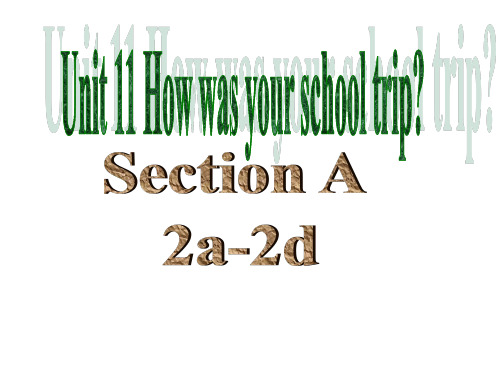
2a Listen and check the questions you hear.
√ √
√ √
What did the farmer say? Did you grow any applgrow apples? Did you learn anything? Did you eat them? Did you ask him any questions? Were they good?
How ____ was the countryside?
It was beautiful. ____ you go to the zoo? Did
No, I didn’t.
2d. Role-play the conversation.
• Peter: Hi, Eric. How was your trip last week? • Eric : It was excellent. I visited my grandparents in the countryside. • Peter: Oh, nice. What did you do ? • Eric : I went fishing every day. And I fed the chickens with my grandpa. It was so much fun. • Peter: Sounds good. How was the weather there? • Eric : It was great, and the air was so clean. I watched the stars at night. They were so beautiful. • Peter: Lucky you.
【快乐链接】
七年英语下册Unit11HowwasyourschooltripPeriod2SectionA习题课

课后巩固
31 They went to Taihu Farm.
答案呈现
32 They went there by truck.
33 They helped the farmers with apple harvest.
34
Because some of the apples were too high for him/ her to reach.
4. Tom got up late this morning. _L_u__ck__il_y_(幸运地), he wasn't late.
5. The rain stopped and the ___s_u_n___(太阳) came out again.
二、用括号中所给单词的适当形式填空 6. We ____v_i_si_t_ed(visit) our grandparents last week. 7. We all _____w__en_(tgo) to the park and ______h_a_d
9 fed 10 was
11 C 12 D 13 A 14 D 15 A
课后巩固
16 were not 17 What did; do 18 went hiking 19 Did; buy any 20 I didn't; had
21 B 22 B 23 A 24 D 25 C
答案呈现
26 B 27 A 28 C 29 D 30 B
Beijing a long time ago.
A. plan
B. planning
C. planned
D. plans
【点拨】根据句中的a long time ago可知此句用 一般过去时态。故选C。
初中英语七年级下册 Unit11How was your school trip
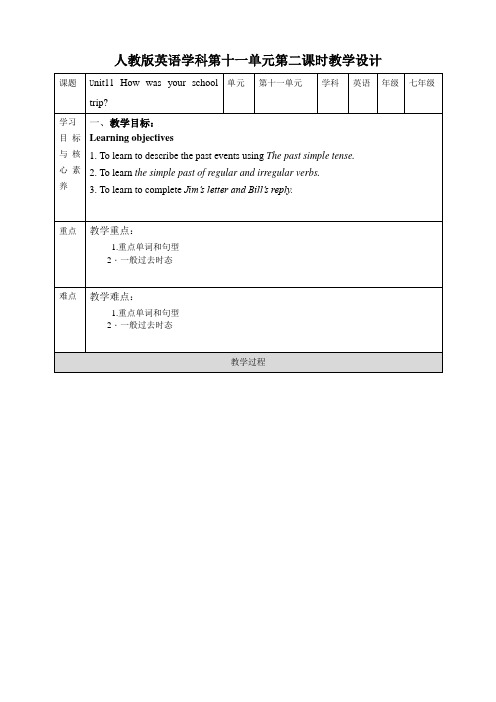
人教版英语学科第十一单元第二课时教学设计课题U nit11 How was your schooltrip?单元第十一单元学科英语年级七年级学习目标与核心素养一、教学目标:Learning objectives1. To learn to describe the past events using The past simple tense.2. To learn the simple past of regular and irregular verbs.3. To learn to complete Jim’s letter and Bill’s reply.重点教学重点:1.重点单词和句型2.一般过去时态难点教学难点:1.重点单词和句型2.一般过去时态教学过程课堂小结Summary1.重点单词:anything, grow, farm, farming, pick, excellent, countryside2.重点短语:in the countryside, from…to…,take them home, go fishing,watch the stars at night, so beautiful3.重点句式:What did the farmer say?Did you learn anything?Were they good?The farmer showed Tina around the farm.It was so much fun.板书anything, grow, farm, farming, pick, excellent, countryside。
人教版新目标版七年级英语下册 Unit 11 How was your school trip Period 2教案
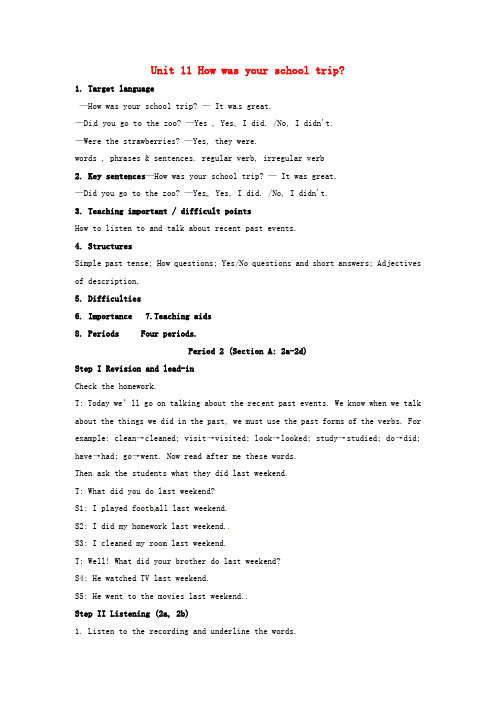
Unit 11 How was your school trip?1. Target language—How was your school trip? — It wa s great.—Di d you go to the zoo? —Yes , Yes, I did. /No, I didn't.—Were the strawberries? —Yes, they were.words , phrases & sentences. regular verb, irregular verb2. Key sentences—How was your school trip? — It was great.—Did you go to the zoo? —Yes, Yes, I did. /No, I didn't.3. Teaching important / difficult pointsHow to listen to and talk about recent past events.4. StructuresSimple past tense; How questions; Yes/No questions and short answers; Adjectives of description.5. Difficulties6. Importance7.Teaching aids8. Periods Four periods.Period 2 (Section A: 2a-2d)Step I Revision and lead-inCheck the homework.T: Today we’ll go on talkin g about the recent past events. We know when we talk about the things we did in the past, we must use the past forms of the verbs. For example: clean→cleaned; visit→visited; look→looked; study→studied; do→did; have→had; go→went. Now read after me these wo rds.Then ask the students what they did last weekend.T: What did you do last weekend?S1: I played footb all last weekend.S2: I did my homework last weekend.S3: I cleaned my room last weekend.T: Well! What did your brother do last weekend?S4: He watched TV last weekend.S5: He went to the movies last weekend.Step II Listening (2a, 2b)1. Listen to the recording and underline the words.T: OK. Do you know what Carol, Ben and Emma did last weekend? Now let’s listen to a conversation between a teacher and three students. They will talk abot some of the activities and people, but they will not talk about others. Please under-line the words you hear on the recording.Then check the answers.2. Ask the students to listen and write.Check the answers.3. Ask the students to listen to and repeat the conversati on after the recording. Step III Pairwork (2c)1. Ask the students to practice the conversation.Ask the students to read the words repeatedly.Ask the students to ask and answer in pairs.Sample conversations:1) S1: What did you do last weekend?S2: I visited my grandmother.S1: What about your friend, Carol?S2: She went to a bookshop. What did you do?S1: I stayed at home and did some reading.2. Ask the students to make conversations.Step IV GrammarAsk the students to read the sentences in th e Grammar Focus and underline the verbs in them.Show the following.didplayedwentdidwentplayedT: The underlined parts in these sentences are cal led past form. And in English they formed the simple past tense. The simple past tense is one of the most common tenses in English. We use the simple past to refer to an action in the past that is finished.Step V Homework1. Ask the students to learn more past forms of irregular verbs in the dictionary.2. Ask the students to read a short story and pay attention to t he verb forms in the story.。
英语七年级下册Unit11Howwasyourschooltrip[U11B-2]
![英语七年级下册Unit11Howwasyourschooltrip[U11B-2]](https://img.taocdn.com/s3/m/0629c90a657d27284b73f242336c1eb91a373396.png)
the train
It ran so fast. It was hot and slow.
the museum
It was really interesting.
It was big, boring and dark.
Gifts wasn't expensive the gift shop and gifts and they were lovely.
1. How was Jane’s trip? ___It__w_a_s_t_e_r_r_ib_l_e_. _______We_at_he_r w_a_s c_old_. ______ 2. How was Tony’s trip? Things were interesting.
Paintings were beautilful.
mean both.
“___”
__√__ interesting _×___ difficult __√__ lovely _×___ slow __√__ exciting _×___ boring _√___ cool ____ hot __√__ lucky _√___ large _×___ expensive _×___ terrible
Learning objectives(教学目标)
By the end of this class, I'll be able to:
1. 能读懂文章体裁,了解文章大意和对比判断人物的态度情感和观点。
2. 知道并会正确使用新的动词过去式。
3.识记新知识新短语,并能正确使用。
Why do they have different feelings?
2. 知道并会正确使用新的动词过去式。
七年级英语下册unit11how_was_your_school_trip_period_2课件
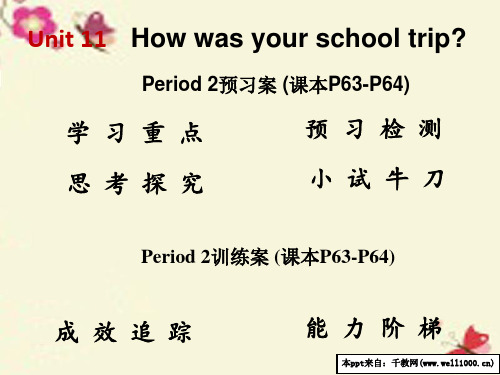
7) stop _s_t_o_p_p_e_d__
8) go __w_e_n_t_______
9) teach__ta_u_g_h_t____ 10) is/am w__a_s____
11) are __w_e_r_e______ 12) grow _g_re_w______
13) 我的父母担心我。
My parents_______w_o_r_r_y_a_b_o_u_t____________me.
本ppt来自:千教网()
小试牛刀
请写出以下动词的过去式:
1) need __n_e_e_d_e_d_
2) climb __c_li_m_b_e_d___
3) show __s_h_o_w__e_d__ 4) arrive _a_r_r_iv_e_d__
5) move _m__o_v_e_d____ 6) worry _w_o_r_r_ie_d___
本ppt来自:千教网()
思考探究
★一般过去时的动词变化规则: 1. 一般情况直接在动词原形后加 _e_d_____, 如: want --- wanted。 2. 以不发音的e结尾的动词,词尾直接加 __d______, 如: live --- lived。 3. 以“辅音字母+y”结尾的动词,把y变___i____, 再加ed, 如: study --- studied。 4. 重读闭音节且末尾只有一个辅音字母的动词, 要____双_写__该辅音字母再加ed, 如: stop --- stopped。
本ppt来自:千教网()
5. 有些单词需要特殊记忆, 如: buy --- bought, have --- had, go --- went, eat --- ate, see --- saw, is(am) --- was, are --- were, do --- did, come --- came, grow --- grew, get --- got, teach --- taught, ride --- rode, tak词时为不及物动词,常用于短语worry about sb./sth.。 worry 的形容词是worried, 常用于短语be worried about sb./sth. 担心某人/某物。
七年级英语下册Unit11Howwasyourschooltrip (002)
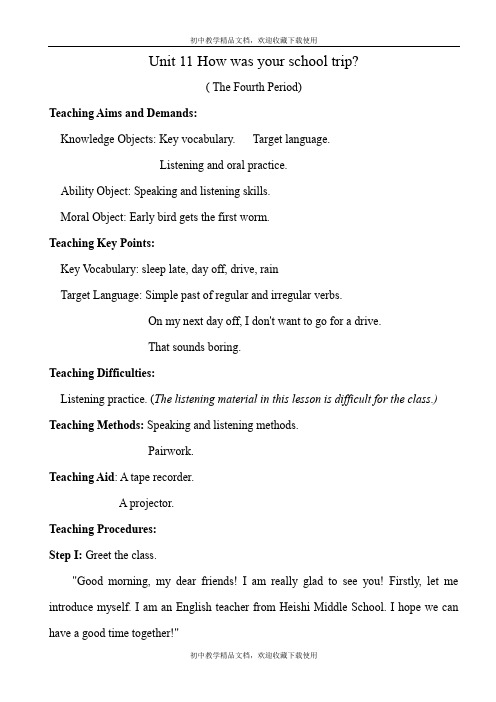
Unit 11 How was your school trip?( The Fourth Period)Teaching Aims and Demands:Knowledge Objects: Key vocabulary. Target language.Listening and oral practice.Ability Object: Speaking and listening skills.Moral Object: Early bird gets the first worm.Teaching Key Points:Key V ocabulary: sleep late, day off, drive, rainTarget Language: Simple past of regular and irregular verbs.On my next day off, I don't want to go for a drive.That sounds boring.Teaching Difficulties:Listening practice. (The listening material in this lesson is difficult for the class.) Teaching Methods: Speaking and listening methods.Pairwork.Teaching Aid: A tape recorder.A projector.Teaching Procedures:Step I: Greet the class."Good morning, my dear friends! I am really glad to see you! Firstly, let me introduce myself. I am an English teacher from Heishi Middle School. I hope we can have a good time together!"Step II: ReviewTalk about the students' last weekend."Now I want to know what you did last weekend and how your weekend was. Let's talk about it together."T: What did you do last weekend?S:…T: How was your weekend?S:…Show some pictures on the screen to help the class if it's necessary.Then show the title of this unit.Step III: Introduction and Lead-inThis class we will talk about what we don't want to do on next day off. Then Tony and Tiny will tell us what they did on their last day off. Let's play together with them. Step IV: V ocabularyShow the new words on the screen.Help the class try to read the new words.Explain the important ones to the class.1. sleep late 睡过头,起得晚sleep → slepteg: Most students sleep late on weekends. But I think we shouldn't sleep late.I slept late yesterday and I was late for school.2. drive 驾驶,驱车旅行go for a drive 开车去兜风3. day off (因病或节假日)不工作;不上学eg: We have two days off every week.I have a bad headache and I have to ask for a day off.Read and repeat.Step V: PairworkLook at the pictures and phrases in 1a.Ask several students to read the phrases to the class.Then make the class rank these activities. (Number 1 is the activity you dislike most.) Now discuss your results like this:A: On my next day off, I don't want to go for a drive. That sounds really boring.B: Oh, really? I think that sounds fun.Pay attention to the word sound.Ask pairs of students to read the dialogue above to the class.Now work with your partner. Say how you feel about the activities in 1a. Please make up some new dialogues.Let several pairs show us their conversations.Step VI: Listening practiceRead the instructions to the class.Look at the chart in 2a. And pay attention to the activities in the first column.Play the recording the first time. The students only listen.Play the tape again. And ask the students to finish the chart.Check the answers. Let the class answer this question: What did Tony/ Tiny do onhis/ her last day off?Now pay attention to the statements in 2b. And ask several students to read the statements.Play the recording. And ask the class to finish 2b.Check the answers together.Step VII: PracticeComplete a letter from Tony.Translate two sentences.Step VIII:SummaryToday we have learned what Tony and Tina did on their last day off. And we also talked about our thoughts. I hope we can keep healthy and get good grades in future. So don't always sleep late on your day off.Step IX: HomeworkPractice 1b and 2c.Write a short paragraph about what you did on your last day off.Step X: Blackboard DesignUnit 11 How was your school trip?A: On my next day off, I don't want to go for a drive.That sounds really boring.B: Oh, really? I think that sounds funtook a classslept latehelped mom and dadwent camping in the rainTeaching Feeling:————————————以下无正文————————————文档为相关教学资料,单元测试卷,专项练习,期中期末测试卷等,均为word文字可编辑版,如果刚好符合你要求,欢迎收藏下载使用。
最新人教版新目标七年级英语下册 2Unit 11 How was your school trip Period课件2
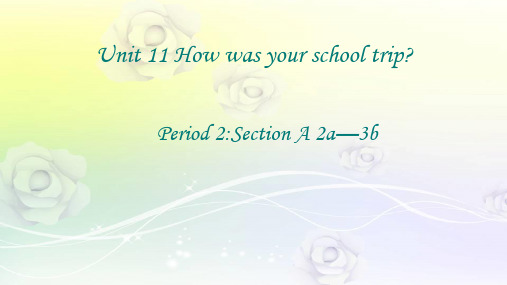
Homework 1.Recite the new words and useful expressions. Recite some sentences you like. 2.Make a story with the Simplelay ▲Please underline the verb phrases in the conversation and write out the infinitive.
visited my grandparents went fishing fed the chickens watched the stars
visited – visit went – go fed – feed watched – watch
▲Read the conversation after the tape and pay attention to the pronunciation and tone. Ss: ...
▲Now make your own conversation according to the dialogue. You need to use the following questions. Questions: How was the trip? Where did you go? How was the weather there? What did you see? What did you do? Did you buy anything? Was the food delicious? ...
After listening. Please read the conversation after the tape. Then ask and answer questions about Tina’s visit to the farm. You can go like this: A: What did Tina do? B: She picked some strawberries. A: ... B: ...
- 1、下载文档前请自行甄别文档内容的完整性,平台不提供额外的编辑、内容补充、找答案等附加服务。
- 2、"仅部分预览"的文档,不可在线预览部分如存在完整性等问题,可反馈申请退款(可完整预览的文档不适用该条件!)。
- 3、如文档侵犯您的权益,请联系客服反馈,我们会尽快为您处理(人工客服工作时间:9:00-18:30)。
《Unit 11 How was your school trip》
教师寄语:An idle youth, a needy age. 少壮不努力,老大徒伤悲。
【预习导学】
1.学习目标
1.学习并掌握动词-ed形式的构成。
2.学习一般过去时的肯定句、否定句、一般疑问句及其答句的构成,并完成相关练习。
2.自学任务
Task 1仔细观察以下四个表格,试着总结动词-ed的变化规律。
动词-ed的变化规则:
1. 一般情况下,直接在动词原形后加-ed;
2. 以不发音的结尾的动词,直接在动词原形后加d;
3. 以_____ +______ +______结尾,末尾只有____个辅音字母的重读闭音节,先双写这个辅音字母,再加-ed。
4.以_____ +______结尾的动词,变y为i,再加-ed.
不规则动词:
do; does----did is; am----was are-----were
have----have eat---ate buy---bought
go----went feed---fed ride---rode
Task 2 认真阅读以下文字,了解一般过去时态的定义。
一般过去时态(past indefinite tense)
一、用法:
一般过去时表示在过去某个特定时间发生,也可以表示过去习惯性、经常性的动作。
一般不强调动作的影响,只说明事情。
I had a word with Julia this morning. 今天早晨,我跟朱莉娅说了几句话。
I took a walk in the morning. 我曾经在早上散过步。
二、常用时间状语:yesterday,last week ,in the past, in 1993, at that time,once,before,
a few days ago等等
Task 3 Grammar chart
观察下面的两个表格,注意黑体字。
进一步了解一般过去时态的肯定句、否定句、一般疑问句及其答句。
试着总结变化规律。
(1)
注:was not ==wasn’t were not==weren’t
(2)
注:did not===didn’t
【课堂活动】
1.预习展示
I. 写出下列动词的过去式.
1)play 5) do 9) worry
2)study 6) have 10) is
3)visit7) eat
4)climb 8)stop
II. Make a summary.
2.课堂展示
Step 1 Preview feedback
Activity 3a
Dear Bill,
How _____ (is) your school trip yesterday?_____ (do) you _____ (go) to the zoo? _____ (do) you take any photos? _____ (do) you _____ (see) any interesting animals?
I _____ (go) to the zoo last year and it _____ (is) a lot of fun.
Jim
Dear Jim,
My school trip _____ (is) great! We _____ (have) so much fun! We _____ (go) to Green Park. We _____ (climb) the mountains there and _____ (see) a lot of flowers. We _____ (eat) our lunch under some trees and ______ (play) some games after that. But at about two o’clock, it _____ (get) very cloudy and we _____ (worry) it would rain. Luckily, it ___________ (do not), and the sun _____ (come) out again!
Bill
Step 2 句型转换.
1.I went to the park yesterday. (改为一般疑问句)
you to the park yesterday?
2.Did Mike ride a horse?(对该句做否定回答)
, he .
3.She was in Shanghai three days ago.(将该句变为否定句)
She in Shanghai three days ago.
4.Jack had a school trip last month.(将该句变为否定句)
Jack a school trip last month.
Step 3 将下列句子改为一般过去时.
1.He has a great time.
___________________________________________________________________________ 2.They don’t get good jobs.
___________________________________________________________________________ 3.There is an interesting movie.
___________________________________________________________________________ 4.Are there any seals here?
___________________________________________________________________________。
